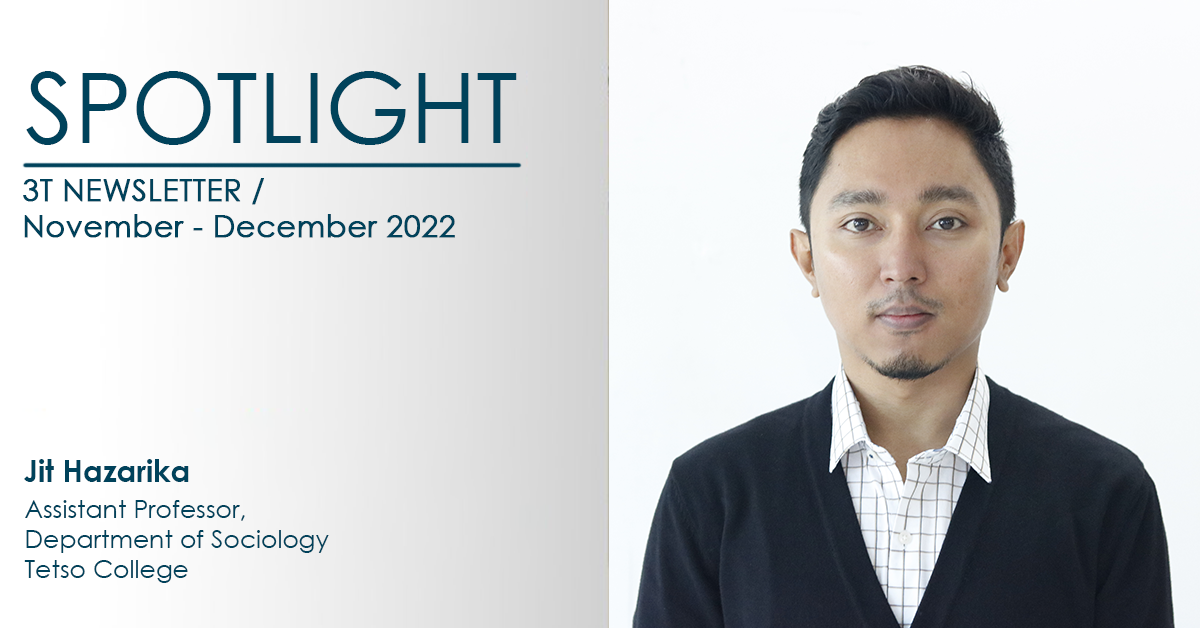3T: Kindly introduce yourself and tell us how it was like growing up.
Jit: I’m Jit Hazarika. I’ve been engaged with Tetso College as a faculty member at the Department of Sociology. I’m pursuing my doctoral research at the Tata Institute of Social Sciences. An Ahom by ethnic heritage, I was born and brought up in a nucleated family in the flux of a rapidly urbanising 1990s Guwahati with its diverse cultural milieu. This I believe has shaped, to an extent, my preference for an independent and pluralistic approach. I grew up with working class precarities and overwhelming parental expectations. In hindsight, it kept me grounded throughout my childhood and adolescent years. Walking through my higher education I have been able to switch between disciplines and develop the worldly curiosities of my younger self into an academic interest, and presently I aspire to contribute to the field of social anthropology. As of late, I have been identified as an academic activist, a label I would not disown.
3T: What is a typical day like in your life?
Jit: I don’t adhere to a strict regimen but a usual working day begins with a duel with the alarm clock. On the better days I start off with a more nourishing breakfast. Then work, work, work. In between I steal time for tea with colleagues. Post work, I indulge myself with a nap, food, and some leisurely ‘scrolling’. In the evening I go for a walk and update myself with the news. On odd days I speak with my family members. When I’m not procrastinating I spend time on my research. Preparation for upcoming lectures is a constant. To close the day I read or watch something. I forgot to mention the mails. They keep coming. I only wish they were delivered by owls.
3T: What are your must-have smartphone apps?
Jit: WhatsApp/Telegram, Google map, UPI app, Spotify, Truecaller, Twitter.
3T: Everybody has good and bad days. As a teacher, how do you motivate yourself on bad days to impart knowledge to your students without fail?
Jit: Firstly, I believe knowledge is a collaborative work between teachers and students. Paulo Freire highlighted how the banking concept of education understands one as the depositor and the other as a passive recipient of knowledge. We need to change this approach. Coming to the immediate question on bad days, fortunately my mind is able to segregate the different areas of functions. So I don’t necessarily carry the stronger emotions from elsewhere when I enter the classroom. Of course there are times when one can be emotionally paralysed and that is when we need to be more kind to ourselves. But the motivation to present my best in a class comes from the students themselves. I am energised by their engagement. On days when this isn’t forthcoming I turn to a hope of there being enough patient ears converted to intrigued minds by the time I exit.
3T: In which other teacher’s class would you like to enroll, even for a day and why?
Jit: I would actually like to gain some training in linguistics. I had shared my interest with Dr. Sahiinii for the language documentation course that his team had offered recently at the college. This interest may be partially attributed to the fact that I belong to a community which has already lost its language. Languages are worldviews and it is a loss when they die. Some formal learning in this area would also be helpful for my research. So given a choice now I’d enroll for Dr. Hima’s class. Perhaps for a proper course rather than a day.
3T: Is there a quote or saying that you live your life by?
Jit: Nothing as such, but I’d like to quote one of Kafka’s aphorisms which carries an important message:
“Humility provides everyone, even him who despairs in solitude, with the strongest relationship to his fellow man, and this immediately, though, of course, only in the case of complete and permanent humility. It can do this because it is the true language of prayer, at once adoration and the firmest of unions. The relationship to one’s fellow man is the relationship of prayer, the relationship to oneself is the relationship of striving; it is from prayer that one draws the strength for one’s striving.” (The Blue Octavo Notebooks)
3T: What book are you reading at the moment?
Jit: Nervous Conditions by Tsitsi Dangarembga. This has been on the stack for a while. It’s a contemporary classic fiction on the postcolonial African female subject dealing with issues of race, colonialism, patriarchy, class, religion. Another book I’m reading is Plantation Crisis by Jayaseelan Raj. This one is an ethnography of Dalit lives in Peermade and Munnar tea plantation belts (Kerala) and their social and political alienation in moments of economic rupture.
3T: Can you tell us your hobbies? What is one of your hidden talents?
Jit: Not as a hobby or talent but sometimes I write. Imagine if I could develop it into something that also brings me pay cheques. See how I flatter myself? We should all do that sometimes.
3T: You have 1,000 unread emails in your inbox; whom do you respond to first?
Jit: First my Phd supervisor, but with some palpitations.
3T: Who inspires you the most and why?
Jit: This one is a bit clichéd, but for her perseverance against all adversities and contribution to the family and my personal growth my mother will always remain the first inspiration.
3T: If you had a free day without college or pending work, how would you spend it?
Jit: Doing nothing is actually an underrated privilege. I imagine it is a free day in midwinter. If I’m not cooking myself an elaborately happy meal I’d like to be basking in the sun with a book and fresh oranges. If I’m feeling social I might invite some friends for dinner.
3T: Having been a student yourself, is there any mistake that you committed as a student that you don’t want your students to make?
Jit: To not be obsessed with doing things perfectly, and not to beat yourself with incredible expectations. Equally important is to have your plans vetted by others. I was shy to seek guidance as a student. Not many are privileged with access to the kind of resources or guidance that they need, especially in navigating through spaces in higher education. So you have to seek out help. Approach people who are willing to listen and extend support. Having said that, seek guidance that allows for organic growth. Lastly and most importantly is giving attention to mental wellbeing. Be open to receiving help whenever you feel the need for it. That’s too many points I think. Maybe I should write a self-help guide.
3T: Among the people you’ve worked with, who do you admire and why?
Jit: I have met and worked with some wonderful people from different walks of life through my engagement with student politics. I have special admiration for a few for their commitment to values of social justice and gender rights. I will not mention the names but they have persevered through social oppression and are currently establishing themselves in academia. All power to them!
3T: What does being successful look like to you?
Jit: To have at least three published books to my credit. Earning at least four times of my present income. At least five sad people present at my funeral. Any two of the aforementioned, but preferably all. In the same order.
3T: If you could have dinner with anyone, dead or alive, who would you choose?
Jit: Religion being one of my research areas I’d really like to meet and interview Jesus Christ. Seriously.
3T: If you could change one thing about the current college environment, what would it be?
Jit: Make the campus more disability friendly.
3T: Describe Tetso College in 3 words.
Jit: Potential for excellence.








